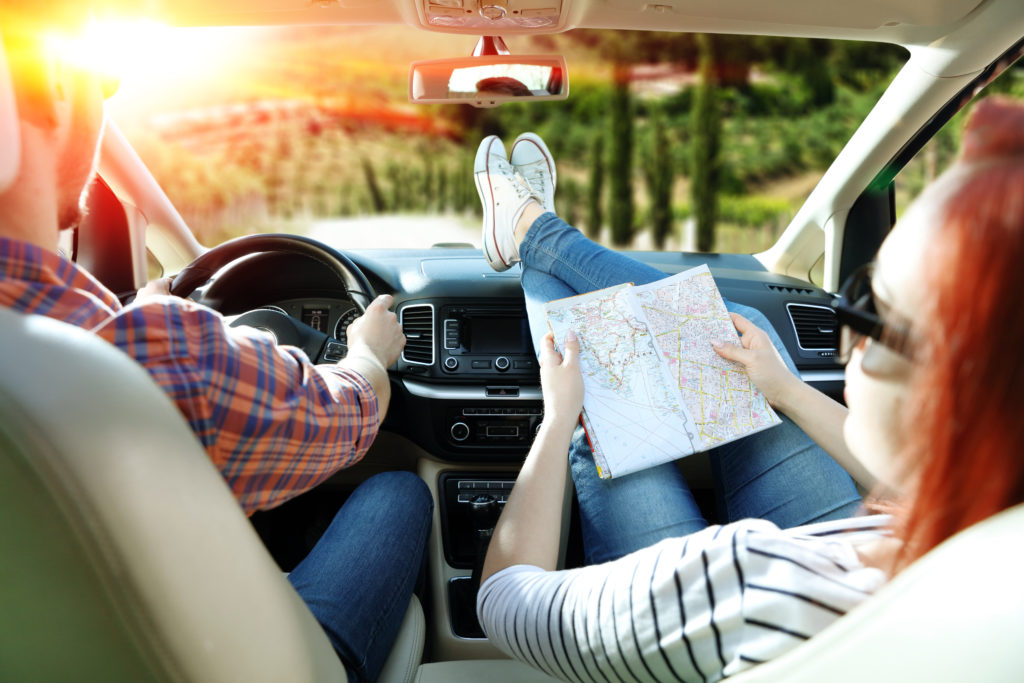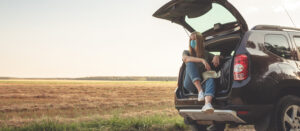Planning a road trip during a pandemic requires more planning and preparation than in normal times. Following these COVID-19 road trip safety tips can help reduce your chances of getting sick while traveling.
And finally, once you arrive at your destination, all the same recommendations apply – physical distancing, mask wearing in designated spaces, and having good hand hygiene remain crucial.

All of the products featured in this story were hand-selected by our travel editors. Some of the links featured in this story are affiliate links, and Airfarewatchdog may collect a commission (at no cost to you) if you shop through them.
Be Flexible
Planned to stop at a certain rest stop but it’s packed or looks unclean? Have a backup plan so that you’re not forced to stop somewhere that seems unsafe. Remember that many places (like coffee shops) may have closed their restrooms, so it’s always good to have a second or third choice planned.
Come Prepared
In addition the typical road trip safety supplies (like an emergency kit), make sure you pack the COVID-19 essentials. Bring the best mask you have (preferably an N95 or surgical one if you have it), sanitizing wipes, hand sanitizer, paper towels and toilet paper (in case the public restroom is out).
Related: Best Car Emergency Kits
Pack Food and Drinks
Minimize stops and avoid eating indoors with other people by packing your own food and drinks. A car cooler and some ice packs will let you have cold beverages and fresh food, and you can bring a picnic blanket or camp chairs and dine anywhere that looks scenic.
If you can’t bring your own food or want a hot meal, try to use the drive-through, curbside pickup, or outdoor dining sections at restaurants wherever possible.
Related: The 13 Best Snacks for Road Trips
Choose Your Lodging Wisely
If you have to stop overnight on your road trip, choose your hotel carefully. Ideally, look for a hotel/motel that has exterior corridors, a separate HVAC system in-room, contactless check-in, and other enhanced sanitizing measures. A vacation rental could also be a good choice, as you don’t have to interact with staff or other guests, but they might not be cleaned to the same standard as a hotel.
Dr. Catherine Le, an infectious disease specialist at Cedars-Sinai, says: "When it comes to road trip accommodations, make sure your hotel room or rental property is thoroughly cleaned and there is enough time in between guests. In addition, the new policies for property rentals or hotels vary from state to state – some places will require a negative COVID-19 test within a certain amount of time prior to check-in, so you will want to make sure you are aware of this before traveling."
Refuel Safely
Pack disposable gloves and use them while you’re pumping gas (and then throw them away and sanitize your hands before you touch anything else). Or, the Centers for Disease Control and Prevention (CDC) advises: “Use disinfection wipes on handles and buttons at the gas pumps before you touch them. After fueling, use a hand sanitizer with at least 60 percent alcohol. When you get to your destination, wash your hands with soap and water for at least 20 seconds.”
Confirm Opening Hours
Although tourism is opening up as travelers get vaccinated, attractions, restaurants, and rest stops still may be closed or have limited hours due to the pandemic. If there’s somewhere you absolutely need to visit on your road trip, make sure you call ahead to confirm when they are open. Some hotels may be subject to these altered schedules as well, so you might want to book your accommodations in advance rather than planning to stop whenever you get tired.
Related: 12 Best Road Trip Games for Families
Research Your Destination
Before setting off, familiarize yourself with the rules and restrictions of your destination (or any destination that you may be spending a few nights in). You may need to quarantine upon arrival (or before visiting), have a negative COVID-19 test to comply with local regulations, or show proof of vaccination.
Do your research to find out what will be open at your destination. Some states are maintaining stricter COVID-19 restrictions than others, and there may be specific mask mandates or other rules in place that you’ll need to be aware of. Also, consider the rate of cases at your destination, and think about postponing your trip if they are rising significantly.
Prepare a Return Plan
Check the government website for your state to find out what the rules are for returning after out-of-state travel. While most states are no longer requiring travelers to quarantine or take a COVID test after domestic travel, it is still best to follow the recommended CDC guidelines for returning home from an out-of-state trip.
Related: 5 Important Vaccine Card Tips for Travelers
Don't Forget Your Vaccination Card
As more and more people get vaccinated and, increasingly, become eligible for a booster shot, many destinations and venues are instituting a vaccine requirement for entrance. Make sure to pack your vaccination card and keep a photo of it on your phone. Remember—don't laminate your original vaccination card! To protect it from damage, try storing it in a protective vaccination card holder.






